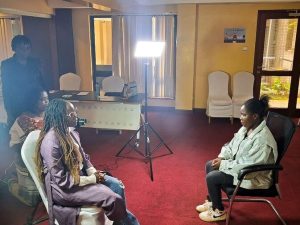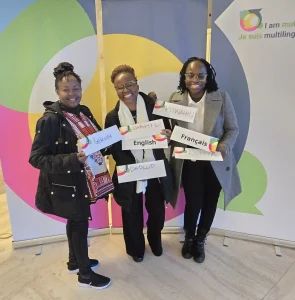Date: 17th August 2023
Time: 8:00 am to 4:30 pm
Venue: Royal Tulips Hotel Nairobi
Introduction
KICTANet in partnership with GIZ is implementing a project on Online Gender Based Violence in Kenya. The Project has two parts one on qualitative and quantitative research on online gender-based violence in Kenya and one capacity building on online gender-based violence for women in politics, journalists, law enforcement agencies and the LGBTQ+ community.
According to research conducted by Plan International, at least 58% of girls have experienced online harassment. Online Gender-Based Violence (OGBV) refers to any form of violence, harassment, or discrimination targeting individuals based on their gender identity or expression, which occurs in digital spaces. Unfortunately, women in politics, journalists and LGBTQIA+ Community are particularly vulnerable to such attacks due to their visibility and influential societal roles.
Last year, KICTANet with support from GIZ developed an e-learning module on online gender-based violence and conducted workshops to build a community of practice on online safety. From last year’s project, we identified the need for customized training for law enforcement officers to understand OGBV and how they can successfully try those cases.
Kenya’s legal framework on Online Gender Based Violence has grown to encompass cyber crimes as provided for in the Computer Misuse and Cyber Crimes Act. Furthermore, in 2022, Kenya passed its Children’s Act which includes online abuse such as cyberbullying, grooming and solicitation, cyber enticement, cyber harassment and cyberstalking. The victims of Online Gender Based Violence have a right to access justice but this is hindered by low awareness of the forms and harms of Online Gender Based Violence among stakeholders in the law enforcement sector.
Background and Context
Gender-based violence against women, girls, boys and LGBTQ+ people is one of the most frequent human rights violations worldwide. Due to increasing digitalization and new framework conditions (including anonymity, automation, remote action, easy accessibility, and dissemination), some of these violent cases now take place online or are intensified within the digital sphere. Those affected are silenced by online violence and driven out of digital spaces. Many exercise self-censorship which has chilling effects on their right to freedom of expression and information, as well as the right to protection and security.
In Kenya, general elections were held on 9th August 2022 and while women were running for political office in record numbers, they also reported disproportionately often being attacked online. A recent study on sexism and violence against women in African parliaments found that at least 42% of female parliamentarians have experienced hate speech and threats of violence online. In response to these developments, in July 2022, the African Commission on Human and Peoples’ Rights adopted Resolution 522 on the Protection of Women Against Digital Violence in Africa which calls for the protection of women against digital violence.
Despite the steadily increasing prevalence of online gender-based violence (OGBV), quality data outlining its scope is scarce and fragmented, especially among LGBTQ+ people or people living with disabilities. Especially on the African continent, there is a high number of unreported cases. This data gap has posed serious challenges for policymakers and activists in advocating for gender-inclusive policies, including policy evaluations for institution strengthening and for improvement of implementation design.
Women in the public eye, LGBTQIA+ people and their advocacy groups are now pushing for solutions to OGBV. Local civil society alliances (among them KICTANet) are already campaigning for the needs of affected groups and entering into dialogue with private and state actors. This initiative will also form a community of practice
Objectives of the training
The training seeks to meet the following objectives:
- To train participants on forms of online gender-based violence, it’s harms and digital security tips to mitigate their occurrence and/or impact.
- To offer psycho-social support to participants which will include mental health tips to assist other victims of online gender-based violence.
- To train participants on the existing legal frameworks on online gender-based violence and access to legal and quasi-legal remedies.
- Foster partnerships among stakeholders, including government bodies, civil society organizations, and tech companies, to collectively combat OGBV and advocate for policy changes.
Expected Outcomes
- Raised awareness about forms and harms of online gender-based violence among participants.
- Participants will be trained on psycho-social aspects of OGBV which will include mental health tips to assist other victims of online gender-based violence.
- Participants will be trained on participants on the existing legal framework for online gender-based violence and access to legal and quasi-legal remedies.
- Networking event for collaborations/partnerships between Civil Society, Tech companies, academia, government and development partners.
Format of the Event
The training shall be face-to-face and take the form of lectures, group activities and exercises.
Participants
The meeting will aim to bring together at least 20 participants who are prosecutors, defence lawyers and police officers at the cybercrimes unit who influence conversations both online and offline, to enhance partnerships, sharing of knowledge and emerging best practices on women’s digital rights.
Programme
| Time | Item | Person Responsible |
| 7:00 – 8:00 am | Arrival and Registration (Signing of KICTANet Participation list) | KICTANet |
| 8:00 – 8:30 am | Brief Opening Remarks | Ms. Grace Githaiga
CEO & Convenor of KICTANet |
| 8:30 am – 10:30 am | Forms of OGBV
Harms of OGBV |
Cecilia Maundu, Digital Security Expert and Podcast Host Digital Dada Podcasts |
| 10:30 – 11 am | TEA BREAK | KICTANet |
| 11:00 – 13:00 pm | Access to Justice for Survivors of OGBV
-Overview of law on OGBV -Criminal Procedures and Penalties for OGBV -Civil Remedies for OGBV -Quasi-judicial remedies for OGBV cases (reporting mechanisms on Social Media Platforms, and other government agencies) |
Marion Ogeto, Lawyer and Programs Officer at Equality Now |
| 1:00 – 2:00 pm | LUNCH BREAK | KICTANet |
| 2:00 – 4:00 pm | Mental Health Tips for Coping with Online Gender-Based Violence | Lowry Achieng |
| 4:00 pm -4:15 pm | Closing Remarks | Angela Minayo |
| 4:15 pm -5:00 pm | Afternoon Tea
Participants leave at their own pleasure |
![]()



